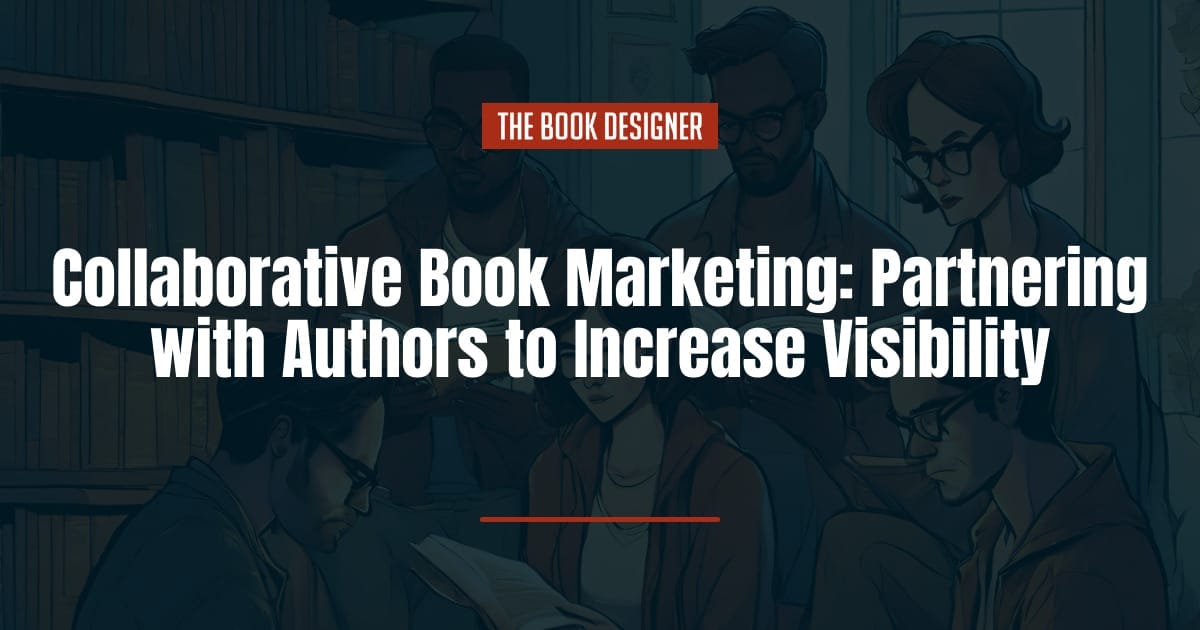The author community is unique to most industries. It is a collaborative community where writers are often eager to support one another throughout the writing process and career journey.
From offering an extra pair of eyes to review a draft, sharing resources, or working alongside each other to boost sales, it’s not the competitive, cutthroat competition that many other industries are known for.
Maybe it’s because the writing process is an isolated one, and as authors, we’re just happy to find someone who understands what we’re going through. Whatever the reason, the writing community is one of the best support systems to have in place as an author.
If you’re looking for ways to partner with other authors to market your books, this article will take a closer look at how to find like-minded authors in your genre and what the book marketing process could look like for you.
Here’s what you need to know about collaborative book marketing:
Book Marketing
At the tail end of the book publishing process, you have book marketing. After working so hard to write a book and then publish it, book marketing is sometimes the furthest thing from an author’s mind. However, whether you are self-publishing or publishing traditionally, book marketing is a necessary part of getting book sales. Even if you have a ready-made audience, building a solid book marketing process is the best way to expand your reach.
Book marketing is the process of getting your book in front of your ideal readers. This can be through social media posts, email marketing, advertising, etc. The idea is to find out where your audience hangs out and put your book in front of them without being too pushy or annoying. One of the best (and least stressful) ways to do this is by partnering with other authors to share each other’s work.

In this article, we’ll focus on book marketing for self-publishers, but authors published traditionally can also glean some ideas, especially if they carry the responsibility of marketing their books. Traditional authors typically work with authors within their publishing imprint while self-publishers work with other independent authors.
If you subscribe to author newsletters, you’ll see this type of partnership a lot. Somewhere in the newsletter, it will say something like “Hey, if you’re looking for a new (romance, thriller, suspense) novel, so-and-so author has a new one out this week, and it’s only 99 cents on Amazon, Book Funnel or one of the many book sites available.
Once you click on the link, you’ll either be taken to the buy page of a retailer where you can purchase the discounted book or get it for free. Or, you’ll be given a link to a landing page where you can subscribe to an author’s email list to receive their book as a download or to read online.
Collaborative Book Marketing (An Interview)
For this article, I reached out to author Jennifer Rodewald. She writes in the Christian fiction genre (small-town romance and young adult ) and has self-published 29 books.
I’ve been on her subscriber list for a couple of years, and something I noticed early on is her ability to seamlessly flow other authors’ books into her newsletters in a way that’s never pushy and somehow just seems to work.
I asked her a few questions about the collaborative process and she was kind enough to share insight on how her book marketing process works.
Me: You regularly feature other author’s books. Is this a partnership? Do other authors share your books, too? If so, why did you decide to go the collaborative route instead of taking a solo approach?

Jennifer: I have a couple of different newsletter formats. One, that goes out about every other week, is a personal letter from me that contains my FB content, the recent events of my life, and thoughts that I have about what I am working on and studying at the moment. In that letter, I also share a “try this author” portion at the bottom (one author per month). These authors/books come from a 12-author round-robin coop group that I am a part of. It’s basically a year-long newsletter builder that we’ve agreed to share each other’s free newsletter sign-up book. It’s been effective, I think, because we are all a part of the same genre (Christian fiction), and most are in the same (or similar) niche of that genre (small town). I’ve really enjoyed the round-robin because not only can I share free books with my readers and help other authors grow their audience, but I have gotten to know authors and their work that I didn’t know before.
The second type of newsletter is my Friday Freebie or Weekend Book Deal email. This one goes out every week on Fridays. I try to feature a free book or one that’s deeply discounted. Sometimes I’ll have authors reach out to me and ask me to share their book when it’s on a free run (which, as long as I feel like it would be something my Christian audience would be interested in, I’m happy to do). Other times, I spend time combing through book charts looking for a deal my audience would like to hear about. It takes more time to do it that way, but my open/click rates tell me that my subscribers appreciate these deals, so I try to send them out consistently.
So, I do both–collaborative and solo. I feel like they’re both important because if it’s all newsletter swaps and trades (collaboration), I think it loses the authenticity of me sharing things that I really think have value and that my readers will like. But I can’t go solo entirely. It doesn’t work because that is a LOT of work for one person, and I’d miss out on meeting new authors and getting to know their work.
Me: How do you find authors to partner with?
Jennifer: I signed up for the newsletter round-robin in a FaceBook group.
I also am a part of a genre-specific group on FaceBook, and they run a deals newsletter specific to Christian Fiction. They run list builders, group sales events, and have been a great part of connection for marketing in my genre.
Me: What have been the benefits of sharing the book marketing process with other authors? (e.g. community, sales, list building)
Jennifer: The major benefit I find in sharing these elements of marketing with other authors is that I feel that I have added value to offer my readers. Every newsletter can’t just be about my books and my sales and my stuff. I’m not that interesting, so that would get old real quick. ;) This way, I have something to offer my subscribers that extends beyond my own catalog (and my own thoughts), and they appreciate it. Hopefully, it also benefits the authors who create the products I share.
Finding Your Book Marketing Team
Whatever your genre, the secret to finding a collaborative book marketing team is a simple one:
Get to know other authors in your genre.
Even if you lean more toward the introverted side (like me, woot!), it’s not hard to find groups where authors in similar genres hang out. In the above interview, Jennifer mentioned Facebook groups. I’ve found author groups on LinkedIn. Others have found their tribe on Instagram and or X(Twitter). Just look around. Authors are everywhere.
A word of caution. If you find an author you believe would be great to work with, don’t start your introduction with “Hi, I write mysteries, do you want to cross-promote each other’s books?” They might delete your message or send you to their spam folder.
As with business partnerships and friendships, you want to get to know someone before making plans. Just because they write in your genre doesn’t mean they’re the best fit for your brand. They could be a perfect match, but how will you know if you don’t take the time to get to know them?
Instead of scaring them away try these tips:
- Follow them on social media and take the time to comment on their posts (authentically and with helpful information if you have it.)
- Outside of social media, writing communities like NaNoWriMo, Scribophile, or The Next Big Writer are great places to start. You can also try Googling “(your genre) + writing communities.”
- If you would rather your book cross-promotions be automated, you can try websites like Book Funnel, The Fussy Librarian, Freebooksy, and BookCave that make it easy for authors within the same genres to be seen together.
Readers have their favorite authors, but they’re also loyal to specific genres, so they’re often willing to take a chance on a new author if they write in the genre they love.
Final Thoughts
One of the best ways to get support within the author community is to provide support.
Recommend your favorite books to others. Buy books. Leave a great review (if you liked it), follow authors on social media, and engage with their posts when the topic is a good fit.
Getting into the practice of supporting other authors will help you build your author community and make it an easier transition when you begin cross-promoting their work.
Book marketing isn’t one of those areas you can afford to overlook when you want to sell more books, but it doesn’t have to be hard. Working with other authors to promote your work can lift some of the burden of self-publishing off of your shoulders and help you grow your author community in the process.




